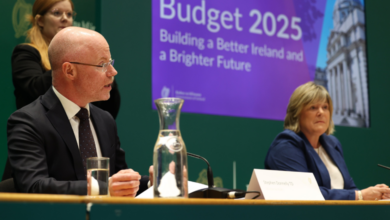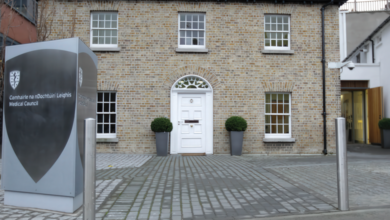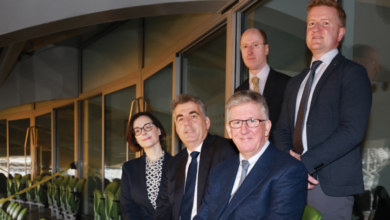HSE CIO Fran Thompson: ‘Healthcare is a whole ecosystem that must be digitised’

 Ciarán Galway sits down with Health Service Executive (HSE) Chief Information Officer (CIO) Fran Thompson to discuss his vision for digital health in Ireland.
Ciarán Galway sits down with Health Service Executive (HSE) Chief Information Officer (CIO) Fran Thompson to discuss his vision for digital health in Ireland.
“For modern healthcare to work, in an efficient and effective manner, it needs to be digitised,” Thompson says. As such, the HSE is establishing a digital roadmap so that the commercial and innovation spaces can link in with that ambition. “It gives us the opportunity to say to people, this is the direction of travel, this is where we are going, this is the train you need to be on,” he adds.
Digital Health and Social Care Strategic Framework
Together, the Digital Health and Social Care Strategic Framework and the Digital Health Strategic Implementation Plan outline the overarching vision (“Better health outcomes enabled by seamless, safe, secure, and connected digital health services which support health and wellbeing for both our patients and providers”), the six principles, more than 40 initiatives, and the roadmap for future of digital health in Ireland. These are also aligned with forthcoming EU obligations.
“Each of the principles of the Digital Health and Social Care Strategic Framework has several projects and programmes associated with it. When you look at them all in their totality, they are aimed at making improvements in tandem within the HSE that have a focus beyond the organisation.
Six Digital Health and Social Care Strategic Framework Principles
“Take, for example, the digitised radiology service which we integrate to the GPs. It would be great if we were able to use that route to send reports to the patient. For instance, when sending the radiology report to the GP, it can be decided whether to also send that to the patient or wait for several days for the result. That is just one system; one solution.”
Health App
Positioning the Health App within the context of the Digital Health and Social Care Strategic Framework, the HSE CIO emphasises ‘the patient as an empowered partner’ as one of its six principles (see textbox).
Empowering Ireland’s patients, he suggests, means making them “a partner in their own care journey”. This is achieved via “seamless access to real-time information, innovative models of care, and collaborative platforms” which are intended to enhance patient experience and facilitate proactive health management. Ultimately, this relies on having the right information at the right time.
“The Health App is one of the elements aligned with this principle. While version one will be our app, as we iterate it, we will be making APIs [application programming interfaces] available so that people can take data in and out, sharing it. Ultimately, by providing a lot more data, we will cultivate a much richer ecosystem.
“Traditionally, there has been a narrative that once a project was delivered, that was the endpoint. However, the reality in healthcare is that systems and solutions must be optimised. Contexts change, solutions improve, processes evolve, and new standards emerge. This understanding must be applied to the Health App. It is impossible to deliver everything on day one,” Thompson explains.
The focus, therefore, is not solely around whether it is technically possible, rather it is about the process change. “As such, all the relevant people must link together and must have a common goal. Once that is achieved, then the technology is often the easier component,” he observes.
The next step is defined by process optimisation. Using appointments as an example, Thompson suggests that an individual could feasibly cancel an appointment in a clinic and then seek to reschedule it to a time that suits them via the Health App. The question then is, in the context of existing waiting lists, should somebody with greater need have greater priority. “The tech can play its role, the rest is down to process and people,” he comments.
|
Six Digital Health and Social Care Strategic Framework Principles
|
Vision
Outlining the HSE’s digital vision, Thompson insists that it is no different to other healthcare systems across the western world: a connected, digitised healthcare system from end-to-end. Ultimately, this requires large systems of record – such as the electronic health record – and a focus on the patient.
“We would love to be able to say that we have provided everybody with a digital experience. That is efficient management of the process. We already have a payroll system and one of the largest estates in the State managed digitally. We must digitise everything, piece by piece.
“The ultimate goal is that we have an electronic healthcare record [EHR] that is fully integrated with all the other elements of our hospitals, and that we have corporate solutions that are fully integrated and optimised. This will mean that the EHR can communicate in both directions; out to the GPs and to the patients, and in from the GPs and from the patients. This is end-to-end; linking in with the National Ambulance Service, for instance. Healthcare is not simply the hospitals; it is a whole ecosystem that must be digitised, and the patient must be at the centre.”





